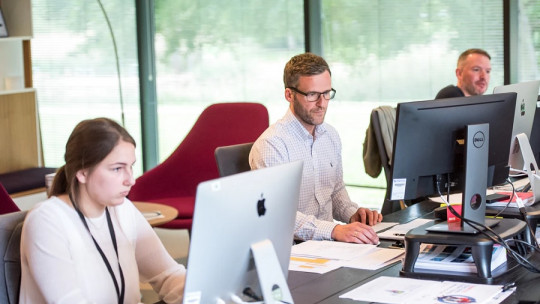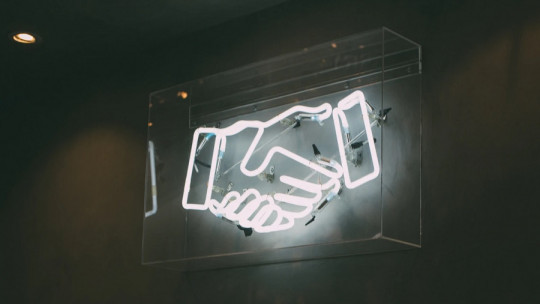Despite education, experience and job training, many people feel that something is wrong when they are at work. It is common that, from time to time, we experience an existential crisis, seeing ourselves as totally incompetent in what we are supposed to be good at or for which we have been trained.
Our mind usually plays tricks on us and, sometimes, makes us feel very insecure in the profession we have chosen, a situation that is never conducive to us. Feeling insecure increases the risk of failure, in addition to intimidating us and preventing us from making ambitious decisions in our employment.
Fortunately, It is possible to work on our confidence in the workplace Therefore, below we are going to see a few tips to see how to have more self-confidence at work.
Tips to have more self-confidence at work
“I will never be able to achieve this”, “I am not good for this”, “I am not good at this job”… Have you ever said these types of things to yourself? If so, don’t worry, it is quite common and, as far as possible, normal. There are few people who throughout their entire professional career have not had any security problems, despising or even denigrating their own abilities. But, despite being relatively common, This lack of confidence and security at work can be a great obstacle to developing professionally and take advantage of all the skills that we undoubtedly have.
Next we are going to see how to have more self-confidence at work.
1. Stop chasing confidence
It’s impossible to always feel confident, so there’s nothing healthier than stopping chasing confidence. This is like happiness, tirelessly searching for it only makes us bitter
Our level of confidence fluctuates, it is unstable. There will be days when we feel more confident in ourselves when working on what we like and others when we don’t so much, such as the day a colleague argues with us. It’s normal, we are not cold machines without emotions.
Even the great successful businessmen, Hollywood actresses and great singers in the music industry acknowledge that, on more than one occasion, they have felt like real failures. They have felt how their confidence was at rock bottom, only to then go through the roof again and become the successful people they are.
For these reasons, do not try to always be confident and sure of yourself, it is not possible. Plus, constantly pretending to have high security is exhausting and frustrating. The more you pursue it, the more insecure and unconfident you will feel, and the sadder too It is true that you have to work on it, but there are many healthier ways to achieve this quality, such as the points that come after this.

2. Dare to act
Self-esteem does not depend on the results of our actions, but on the actions themselves. This conclusion was reached by Richard L. Bednar and Scott R. Peterson, two psychologists who are experts in self-esteem.
They themselves showed it by talking about the case of patient cases. When one of them did not show up for an exam after having spent time preparing for that test, they felt worse than if they took the exam and ended up failing That is, the pride of having tried would act counteracting the influence of the disappointment and sadness of not having passed the exam.
Self-confidence increases when we take action. Therefore, to have more self-confidence at work you have to try new tasks, take on new challenges, dare to do things. Acting, even if we end up failing in the end, is something that already makes us feel more confident, confidence which will bring us success sooner or later.
3. Maintain a winning pose
Dr. Amy Cuddy conducted an interesting experiment in which she discovered that if someone was asked to adopt a power pose for two minutes, Their testosterone levels increased and their cortisol levels decreased , the famous stress hormone. All of this contributed to him feeling more confident and willing to take risks.
By power pose we refer to those that represent a certain dominance. It would be the typical way of expanding the body, as athletes do when they win, with their arms raised, chest puffed out, and chin up.
The explanation of Dr. Cuddy is that there is a two-way communication between the mind and the body. When we are proud, our posture reflects it If, even when sad, we adopt a pose of triumph, little by little we will feel more confident.
4. Turn fear into enthusiasm
Fear and excitement are two different emotions, but with a similar biological basis, since both are caused by the hormone adrenaline. Theoretically, it would be possible to use it to feel excitement instead of fear
And this seems to have been demonstrated by a study conducted by Dr. Alison Brooks. This researcher separated several students into three groups and, to generate anxiety, had them give an individual presentation while a jury evaluated them.
The first group was not given any prior instructions, while the second and third were asked to repeat out loud “I’m calm” and “I’m excited,” respectively. The final result was that the students of the third group, Those who tried to interpret their nerves as excitement instead of fear did much better
From all this we can recommend that, the next time you face a challenge, try to think that nerves are not fear, but enthusiasm, nerves of excitement. You will surely feel much more confident and do what you set out to do with more enthusiasm.
5. Treat yourself like a friend
What do you tell yourself when you fail? Most of us are very hard on ourselves, telling ourselves uninspiring things like “You’re a failure!”, “You’re so useless,” “You’re worthless…” every time we do something wrong or something that simply hasn’t worked out. perfection.
Would we say these same things to a friend? If we want to keep him at our side, certainly not. When a good friend makes a mistake or fails, far from telling him that he is worthless, we try to console and encourage him so that he does not become depressed.
The time has come for us to treat ourselves like good friends Telling ourselves encouraging things, encouraging ourselves by telling ourselves that everything will turn out well, that we will achieve our goals and that we don’t have to get depressed because there have been some things that have failed sounds simple, but it works.
Self-compassion is capable of reducing insecurity, stress and anxiety, in addition to increasing the amount of positive thoughts, which never hurts. But very important: Self-compassion does not mean feeling sorry for yourself, but rather treating yourself as you would a friend when they fail or something bad happens to them. It is knowing how to value the fact that you have tried instead of punishing yourself for having made a mistake.
- You may be interested: “Self-care through the practice of Mindfulness and self-compassion”
6. Go to therapy
The most effective way to deal with discomfort due to personal complexes and insecurities is to go to psychological therapy In the consultation of a psychologist you will find the appropriate tools to manage your emotions, adopt a new way of life more consistent with your values and interests, and learn to express yourself assertively.
Therefore, if you are looking for psychology services, contact us. In PSiCOBAi We will be happy to assist you in person or online.









